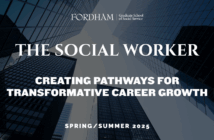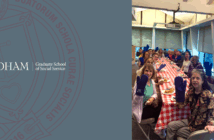On Saturday, October 21, Fordham GSS hosted the 5th Annual One Girl, Inc. conference to an audience of over 100.
One Girl, Inc. Background and Mission
Founded by GSS alumna Meghan Barakett, One Girl, inc. is a 501(c)(3) non-profit organization based in NYC dedicated to developing and strengthening its members through charity, advocacy, and community organizing.
The organization is “fueled by a desire to care for the needs of a diverse community,” uniting its members and the community it serves through charity, advocacy, and community organizing.
“Through policy intervention, tailored volunteer opportunities, education/training and self-empowerment, transformative practices, One Girl provides individualized programs that support and encourage the sustained growth of women in the workforce, within their home lives and in society as a whole,” its website reads.
Women in Charge
The conference’s title was “Women in Charge,” and the theme focused on Building our own Path Forward. The event was held in the 12th-floor Lounge of the Lowenstein building at Fordham’s Lincoln Center campus.
The day’s agenda featured two panels:
- Embracing Change in the Workplace
- Bridging Then and Now (Advocacy)
One Girl designed the panels for women at all stages of their lives and careers “to make you feel inspired and help you find the right tools and resources for your next step.” Both were moderated by Angelica Malin (@jellymalin).
Panel One: Embracing Change in the Workplace
Panel One members were a medley of C-suite executives and entrepreneurs:
- Sharifa Murdock (@Shairfasays), Chief Impact Officer at KITH (@kith), Founder of envsn (@envsnfest)
- Mayssa Chehata (@mayssa), Founder of Behave (@eatbehave)
- Brittany Lo (@brittany.lo), CEO and Founder of Beautini & Beia (@beautini & @beiabeauty)
- Kat Garcia (@katgarciaonline), Founder of Ground AI (@joinground)
The conversation covered each panelist’s backgrounds and career trajectories, which ranged from positions at the NFL and Uber, to working as a child actress. Each individual’s personal story shaped their pathways to the C-suite and founding their own companies.
But sometimes, panelists said, women can be quick to self-judge and harsh on themselves when choosing a career and finding their way professionally. Just because you are still figuring it out, they added, doesn’t mean you can’t give yourself that space.
“Give yourself grace,” Murdock said. “Everyone started where you were once. Find what’s going to make you happy.”
Panelists said they had experienced external pressures from family members growing up and that it was difficult explaining their professional decisions to those closest to them. Garcia noted that she would have to paint her career decisions “in probabilities” to get through to her mathematically inclined father and decided to listen to her intuition when he had doubts.
“Our parents want us to be successful,” she said. “Listen to your intuition above everything else, even if you can’t explain it to other people.”
Panelists agreed, however, that successful networking is crucial to any career. Having a small circle of people you can trust to help talk through your decisions can help you spot opportunities you may not have seen on your own.
“Understand who you can reach out to in your network,” Lo said. “And make it easy for people to understand. Don’t push away advice; find the people you trust and value their advice.”
Chehata added that you shouldn’t only direct your networking efforts at the higher-ups. While you should try to get in the room with successful people to learn from their wisdom, Chehata said some of her best connections came from colleagues at the same career stage as her. They grew in their careers together, stayed in contact, and now watch one another thrive in many different industries.
“Networking with people at the same level as me has changed my life,” she said. “We’re always focused on networking with people higher than us, but there’s so much value in networking with those at your level.”
Finally, the women discussed the reality of racism in the workplace. Having multiple women of color on the panel allowed for panelists to speak to their own personal experiences.
“You’re there to do a good job, not to make people feel good,” Murdock said. “You don’t need to be liked by everyone. You just have to be nice.”
Panel Two: Bridging Then and Now (Advocacy)
Panel two boasted a wealth of diverse experience, with panelists who have dedicated their careers to advocacy:
- Lyn Slater, Ph.D. (@iconaccidental), former Fordham GSS faculty member
- Mattie Kahn (@matkahn), award-winning writer, Author of YOUNG AND RESTLESS
- Mia Jackson-Rosenthal (@PIRC.fordhamlaw), Director of Student Engagement and Counseling at Fordham Law School’s Public Interest Resource Center
- Jaslin Kaur (@Jaslinforqueens), former City Council Candidate
Slater began by acknowledging the need for humility when focusing on intergenerational conversations. She stressed that women of all ages today should not be divided over intergenerational blame, which can undermine the power of the collective to make change.
“In order for intergenerational conversations to happen, we have to have humility,” she said. “You are the experts of now. Our power is diluted when we’re pitted against one another.”
Slater shared her own experience being labeled with ageist language by media when she was a social media influencer (a career trajectory she said she has since, after much success, disbanded). The media labeled her as an “instagrandma” and only wanted to speak to her through the lens of an “older” fashion influencer, not just a fashion expert. It reignited her passion for advocacy. Slater said she is getting away from the influencer lifestyle and digging back into her roots as a social worker.
Kahn added that one can also grow and branch out as an advocate. Just because you advocate for one thing does not pigeonhole you into that area for good.
“One kind of activism will almost inevitably lead you to another kind,” she said. “Your own activism can surprise you. Grow into it, and you’ll be surprised what you can accomplish.”
Not only can you branch out, but you can find others who will help amplify your voice, Kaur said. When it comes to advocacy, a whole is greater than the sum of its parts, and combining your efforts with others can be a good way to prevent burnout. She compared advocate collaboration to the shared responsibility within a choir.
“A choir is beautiful because they’re all working together,” she said. “One person can take a break because we’re all giving what we can.”
Jackson-Rosenthal said her experience working with law students is part of why she “genuinely believes” in the generation coming up after her. She cited Gen Z’s—specifically the women—priorities of mental health, sustainability, and social justice as the main drivers that will make the world a better place.
View the Gallery
We had the opportunity to capture the day’s events in visual form and written form. Please take a look at some snaps from the day below.







































































































